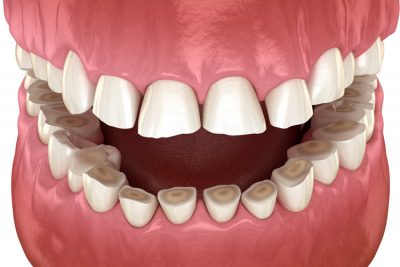 Bruxism is the habit of grinding or clenching your teeth. Although this can occur when you’re awake, it most commonly happens while sleeping. It can affect both adults and children. Although some people may not be aware they have a habit of grinding or clenching their teeth, it can lead to major dental issues.
Bruxism is the habit of grinding or clenching your teeth. Although this can occur when you’re awake, it most commonly happens while sleeping. It can affect both adults and children. Although some people may not be aware they have a habit of grinding or clenching their teeth, it can lead to major dental issues.
Symptoms of Bruxism
Bruxism can lead to substantial wear and flattening of the teeth, increasing your risk of broken teeth, cracks, chips, fillings and even tooth loss. Many people find they have increased tooth sensitivity.
Tension, pain and a feeling of ‘tiredness’ or stiffness in the jaw joint and surrounding muscles are all common symptoms. The pain can feel similar to earache, even though your ear is not affected. Sufferers can also be prone to tension headaches and neckaches.
As bruxism typically occurs at night, for some people this is an intrusive habit that can seriously affect the quality of sleep for yourself and loved ones and impact on relationships.
Causes of Bruxism
In most cases grinding or clenching your teeth is a habit, whether you are consciously aware of it or not. It is often exacerbated by stress and anxiety.
Having a sleep disorder such as sleep apnoea can make you more likely to grind your teeth while you sleep.
Other causes include having an abnormal bite or missing or crooked teeth. Lifestyle factors such as alcohol, smoking, a high caffeine intake and taking recreational drugs can all make you more prone to bruxism. Teeth grinding can also be a side effect caused by taking certain medications.
Treatment
It is important to seek treatment for bruxism for the long-term health of your teeth. Although some people don’t experience any symptoms and may not even be aware they have this condition, your dentist will be able to diagnose it and recommend treatment options for you such as:
- A custom-made nightguard, also known as a splint, to wear while sleeping. These are different from sports mouthguards as they are thinner and more comfortable to wear overnight while protecting your teeth from the pressure of grinding or clenching.
- Botox to stop the jaw muscles from clenching. This can be an effective solution without impacting on your ability to eat and chew.
- Physical exercises including massage to relieve jaw tension.
- Stress-reduction techniques.
- Avoid chewing gum as it can contribute to your jaw tightening up.
Please contact us if you are experiencing any symptoms of bruxism – we can assess your needs and recommend specific treatment options.
